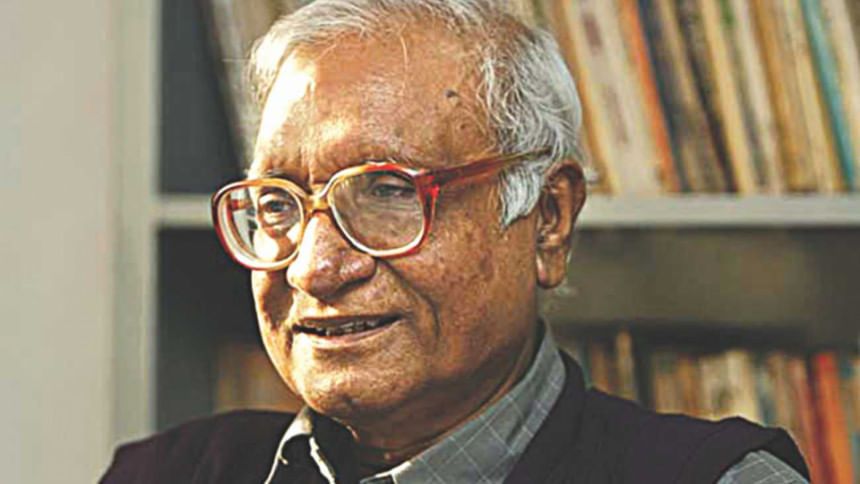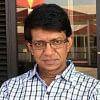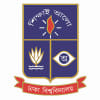Serajul Islam Choudhury: A multi-dimensional teacher

Today, June 23, marks the eighty-first birth anniversary of Serajul Islam Choudhury, the leading public intellectual in Bangladesh. One of the foremost and most productive writers in the Bengali language today, he directly taught me in the English Department, Dhaka University. But he is not only my teacher, not only even a "teacher of teachers," he is also our "nation's teacher," as the poet Syed Shamsul Haq memorably put it last year. Back in the early nineties, while working with Jahanara Imam, I heard her say with a great deal of enthusiasm: "Professor Choudhury teaches us how to remain committed to a cause." Indeed, teaching for Professor Choudhury was never confined to classroom lectures as such, but was—and is—compassion and cause and commitment all made visible. He is an intellectual above all.
But, then, his classroom lectures themselves were characteristically brilliant, energetic, eye-opening, even moving. And his stylistic signature was immediately and even eminently readable. Even today, more than twenty-five years later, I vividly recall many of his carefully chosen words, his steadily cadenced sentences, his bracing statements, his succinct formulations. His lectures were examples of not only his phenomenal eloquence but also his acute sense of precision. Professor Choudhury is one of the most outstanding teachers of English literature I have ever known.
Professor Choudhury taught us Austen and Dickens as well as his favourite trinity of the novelists—Conrad, Forster, and Lawrence—who are usually taken to constitute the canonical "great tradition" of the English novel. However, Choudhury also remains courageously critical of this tradition, without by any means skimping on the aesthetic dimensions and directions of the novels he had taught us. Very early on, Professor Choudhury understood—and also tried to make us understand—that neither deification nor demonisation can enhance what is called "criticism." For him, criticism comes to mean the production of non-coercive, emancipatory knowledge, to use Edward Said's idea here. Choudhury is a first-rate literary and cultural critic by international standards.
But Choudhury's multiple roles as a teacher, a critic, a columnist, a commentator, an editor, a public speaker, an activist, an organiser, even a translator, and an intellectual all remain profoundly intertwined, constituting an exemplary whole to which, of course, the question of human emancipation remains integral. Choudhury has written more than a hundred books and authored countless articles in Bengali and English—only incompletely collected in eight volumes now— that traverse a mind-bogglingly wide range of themes and issues. But if I have to identify one overarching theme in his work, it is no doubt the abidingly Marxist question of human emancipation itself. By this, then, Choudhury means the liberation of humanity from class and gender oppression—in fact, from all forms and forces of oppression and exploitation. In other words, for him, emancipation is impossible without fighting against such global and local—glocal— systems of oppression as capitalism, imperialism/colonialism, and patriarchy, deeply interconnected as they are.
It is from the above-mentioned perspective that Choudhury has also long approached the question of our national liberation of 1971, one which, as he argues, has remained decisively unfinished in Bangladesh. I cannot but repeat a point I already made elsewhere, the point being an important one: Choudhury is undoubtedly our major anti-capitalist, anti-imperialist, and anti-patriarchal writer—and our major socialist writer—one who has been relentlessly advocating the causes of peasants, workers, women, ethnic minorities, while remaining committed to the three distinctly pronounced fundamental principles of our National Liberation Movement of 1971—equality, justice, and dignity. That these principles themselves also serve as themes in Choudhury's works is evident in his epic journey of interventions and interrogations from his earlier work Nirasroyee Grihe (1974) to his relatively recent Jatiyotabad, Samprodayikota o Jonogoner Mukti (2015). Indeed, Choudhury is a full-time freedom-fighter in his own right.
***
I have already written elsewhere about certain major intellectual and critical contributions made by Serajul Islam Choudhury, and I don't need to reiterate them here, although I admit I have not been able to do full justice to the quantity, quality, and variety of his writings. And, of course, it is impossible to do this here in this short piece. But I intend to make a few points about one of his major works—his relatively recent, award-winning, massive book called Jatiyotabad, Samprodayikota o Jonogoner Mukti (2015). I reckon this work as his historiographical tour de force, exemplary as it is of his rigorous and discriminating scholarship on the entire Indian subcontinent's history of ruling-class politics and people's movements since the nineteenth century. The book forcefully reveals what both nationalism and communalism have come to mean to common, ordinary people at least since the days of the "Partition of Bengal" in 1905.
"If "life is lived forward but understood backward"—as the Danish philosopher Søren Kierkegaard once put it—Choudhury can look back and easily say in the words of the Turkish poet Nazim Hikmet: "This is how you must love the earth/so you can say 'I have lived.'"
This work also exposes the contradictory and even anti-people roles of such canonical political figures as Gandhi, Nehru, and Jinnah, among others, who all rolled back the wheels of history before and after the Partition of India in 1947. Choudhury also superbly zeroes in on the relatively progressive but decisively incomplete roles of such figures as Chittaranjan Das and Subhas Bose, among others, thus clinching the point that emancipation itself has remained an unfinished project to which ruling-class nationalism—let alone communalism—can never be an adequate answer. The answer then resides, as Choudhury seems to be suggesting, in the Revolution itself. Again, the unresolved question of people's emancipation informs, inflects, even structures, and textures Choudhury's positions and perspectives. This book is another example of his commitment as an intellectual to naming and questioning systems of oppression and even changing them.
What is also remarkable about this major work by Choudhury is its beautiful storytelling quality, jazzed up by a wealth of detail. It reveals that history cannot be reduced to homophony, yet even the minute and determinate registers of the everyday within the horizon of history itself dialectically throw up both conflictual and converging patterns, ones that Choudhury ferrets out with his labour of love. The historical, the political, the ideological, and the cultural all meaningfully intersect in the book, reminding me of these lines of my favourite Korean poet Ko Won—"To us already,/a birthplace is no longer home./ The place we were brought up is not either./ Our history, rushing to us,/through fields and hills, is our home," while also attesting to Choudhury's brand of interdisciplinarity, both stimulating and innovative as it is. Choudhury's Jatiyotabad, Samprodayikota o Jonogoner Mukti is simply a groundbreaking, matchless intervention in the field of history-writing in Bangladesh. It also permanently establishes Choudhury's place as one of our foremost historians.
If "life is lived forward but understood backward"—as the Danish philosopher Søren Kierkegaard once put it—Choudhury can look back and easily say in the words of the Turkish poet Nazim Hikmet: "This is how you must love the earth/so you can say 'I have lived.'" Indeed, he has lived—and lived with a passion for life and hence with a passion for justice. These days when I think of Choudhury's life, I also think of Pablo Neruda's beautiful and powerful poem called "Ode to Age," whose main message can be summed up in Picasso's famous pronouncement: "Youth has no age." Choudhury's permanent youthfulness surely corresponds to his passion for the Permanent Revolution.
Last, a few words about his sense of humour. There is a stereotypical idea that Marxists lack a sense of humour. There are some who surely do, ones who also think—forgetting the humorous Marx himself—that they should not laugh until the Revolution succeeds. But Choudhury's sense of humour never flags in brio. This comes out subtly in many of his works, while it was frequently evident in numerous conversations I had with him. As I have seen over the years, Professor Choudhury lets out loud guffaws, both simple and subversive. On his birthday today, I wish my teacher Professor Serajul Islam Choudhury a long life of more love and light and laughter so that he can write and fight more energetically than ever before.
The writer is currently Summer Distinguished Professor of English and Humanities at the University of Liberal Arts-Bangladesh (ULAB).










Comments